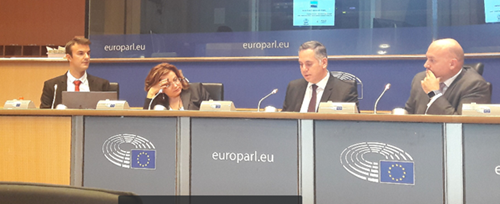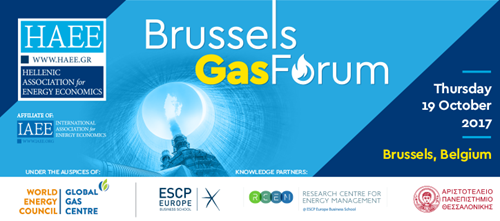In a spirit of close cooperation, Greece and Cyprus presented their positions during an international gas forum organized by the Hellenic Association for Energy Economics (HAEE) with the support of ESCP Business School and its Energy Management Centre (EMC) on 19th October, 2017.
This thought-provoking discussion took place at the European Parliament in Brussels. The integration of natural gas into the European energy environment and its methods of exploitation was highlighted during the event. The keynote speakers, Maria Spyraki, Member of the European Parliament and representative of New Democracy and Nikolas Papadopoulos, leader of DIKO party and candidate for the presidency in the upcoming elections in Cyprus, underlined the necessity of expanding the use of natural gas and its promotion from the Eastern Mediterranean region to Europe, with the cooperation of Greece and Cyprus and through the well-known projects that are supported by the Commission, such as the East-Med pipeline and the LNG terminal in Alexandroupolis.

The fact that Greece is the only country in Europe to impose excise duty on natural gas when used as feedstock than as a fuel was the main message addressed. This excise duty, which was imposed solely on the use of natural gas and not to other energy resources, is in contrary to the principle of competition advocated by the European Union, even though nowadays the country is trying to assist its economy by the development and rationalization of its industrial fabric. The detailed analysis of the unique Greek problem for Europe was made by presenting the study "The Excise Duty on Natural Gas when used as Feedstock" by Filippos Ioannidis, PhD candidate of Aristotle University of Thessaloniki. During the presentation, the economic and legislative aspect of the issue, which creates conditions of unfair competition at the expense of the Greek economy, was thoroughly analyzed.
Mr. Ioannidis pointed out that the taxation of natural gas for industrial uses when used as feedstock creates additional obstacles and puts extra pressures on the hard-tested Greek economy and does not assist economic recovery. Specifically, it was reported that from 2010 to 2015 the economic activity in the industrial sector underwent a drastic contraction of 27%. In Greece, an excise tax was levied on natural gas in 2011, without foreseeing any exemptions or discounts, based on usage or consumption volumes, and in addition he stated that the specific excise duty is in contract with the EU Directive 2003/96/EC and undermines the competitiveness of the Greek industry by significantly increasing production costs.
According to the above study, the Global Competitiveness Index which was recently announced by the World Economic Forum ranks Greece last in terms of competitiveness compared to the rest EU members and 87th in the world among 138 countries. At the same time, industrial consumers in Greece pay 19% more than Europe's average purchase price of natural gas. According to the survey, the foremost reason why Greece is at the bottom line in rankings is the increased taxation rate that acts as a barrier to businesses in Greece and at the same time prevents new investments. A characteristic example of the relevant market distortion is the case of the use of natural gas in the production of fertilizers. Given that natural gas is used as a raw material for the production of ammonia, it is estimated that between 2011 and 2016 the Greek fertilizer industry was burdened by more than 40 million euros due to the excise duty. Additionally, absurd is the fact that it was chosen to tax only gas consumption, although it is the most environmentally friendly energy resource for ammonia production. The Greek fertilizer industry that utilizes natural gas during the production process is unable to compete with similar European industries that do not have the same tax burden.

Next, a discussion followed which was introduced and chaired by Dr Kostas Andriosopoulos, Professor of Finance & Energy Economics at the ESCP Business School and President of HAEE. Initially Panagiotis Skarlatos, General Manager of the Hellenic Association of Chemical Industries, agreed with the above findings and supported the request to abolish the relevant taxation on natural gas when used as raw material. Furthermore, Michal Wendolowski, Manager of Market Analysis of Fertilizers Europe, remarked favorably on the Greek industry's request to abolish the relevant tax and recalled that the ammonia production industry is one of the main ones that is protected by the European Union against carbon leakage. In addition, he stressed that 60% of ammonia production in the European Union is based on the use of natural gas, while most of the 36 European factories with which the Greek fertilizer industry has to compete use natural gas without paying any excise duty. He underlined that, it is unfair to burden natural gas in Greece in this way.
Ashutosh Shastri, BoD member of the Global Gas Center - World Energy Council, described the situation in Greece as "abnormal" since the high taxation on natural gas consumption in fertilizers has devastating effects on the market due to unfair competition. He noted that fertilizers is an important product involved in the food chain. For instance, in India where there is even a Fertilizer Minister, the price of natural gas for fertilizer production is subsidized instead of being penalized as it is the case in Greece. From a legal point of view, Konstantinos Adamantopoulos, legal adviser in Brussels on taxation issues, stressed that apart from Greece, all European countries exclude natural gas used as raw material from an excise duty imposition. The legal framework in Greece is contrary to the basic principle of EU law that prohibits negative discrimination. The imposition of excise duty on natural gas used as a feedstock thus contradicts not only the law but also the spirit of Directive 2003/96/EC, as well as to Articles 107 and 110 of the Treaty of the formation of the European Union.
***
About ESCP Europe Business School
Established in 1819, ESCP has educated generations of leaders and entrepreneurs. With its six urban campuses in Berlin, London, Madrid, Paris, Turin and Warsaw, ESCP's true European identity enables the provision of a unique style of cross-cultural business education and a global perspective on international management issues. The School welcomes 4,600 students and 5,000 executives from 102 different nations every year, offering them a wide range of general management and specialised programmes (Bachelor, Masters, MBA, Executive MBA, PhD and Executive Education).
***
About the Energy Management Centre (EMC)
The EMC's Mission is to build a strong proactive partnership between energy corporations, government agencies, and the academic community, in preparation for a new energy era. This is achieved through the promotion of rigorous and objective empirical research on issues related to energy management, finance, and policy, in order to support decision-making by both government and industry. The results of EMC's research become available to the public through publications, workshops and conferences, educational programmes and other public outreach activities. Research at EMC is enhanced through direct cooperation with government agencies, and academic and industry associates from across the globe.









 Facebook
Facebook Linkedin
Linkedin Instagram
Instagram Youtube
Youtube EMC Newsletter
EMC Newsletter







